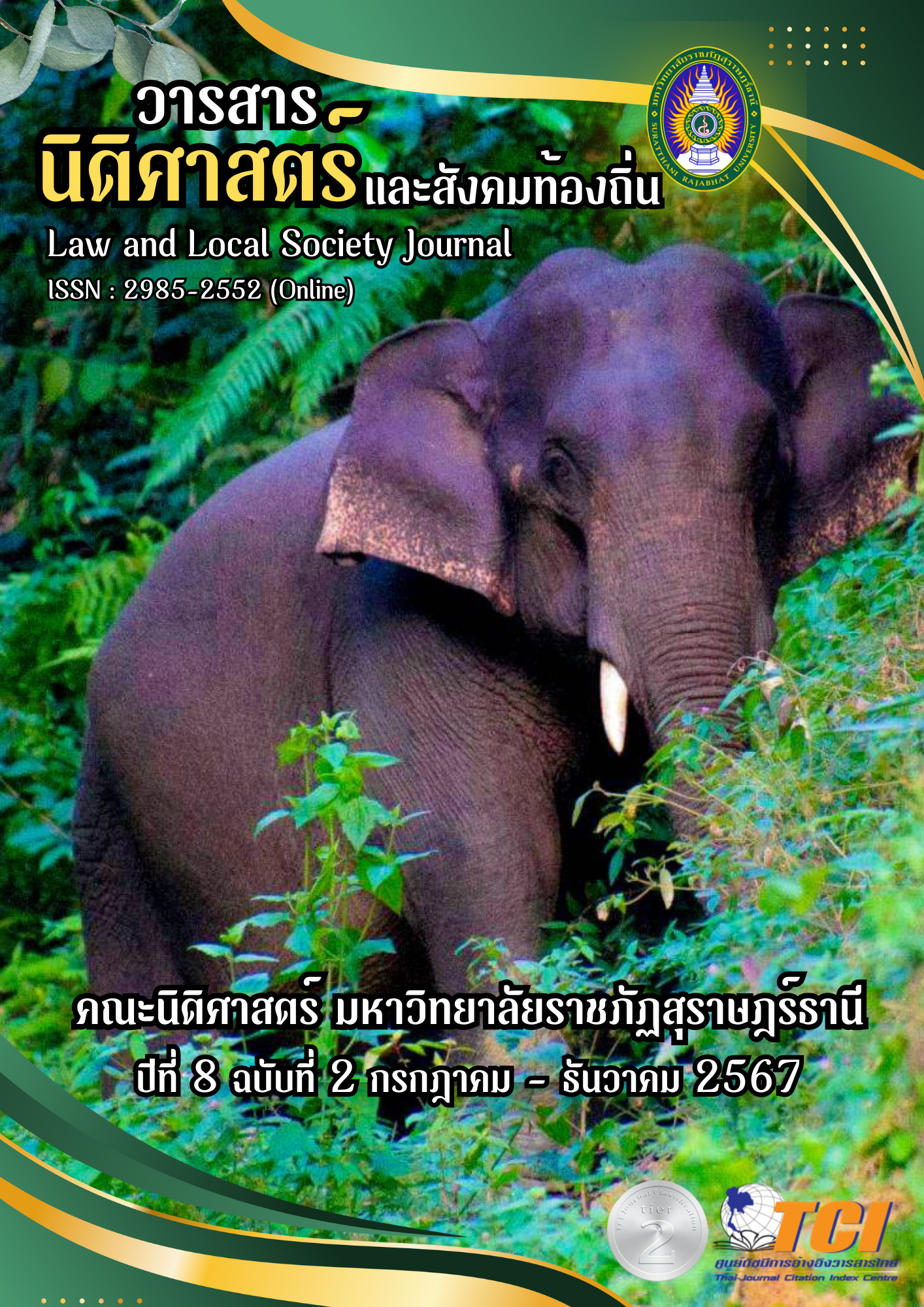ยุทธศาสตร์การจัดการเมืองน่าเที่ยวอย่างยั่งยืน กรณีศึกษา: ชุมชนในเขตเทศบาลตำบลบ้านใต้ อำเภอเกาะพะงัน จังหวัดสุราษฎร์ธานี
คำสำคัญ:
ยุทธศาสตร์การจัดการเมือง, เมืองน่าเที่ยวยั่งยืน, พื้นที่ท่องเที่ยวตำบลบ้านใต้บทคัดย่อ
บทความวิจัยฉบับนี้มีวัตถุประสงค์เพื่อศึกษา บริบทที่มีความสัมพันธ์และพัฒนายุทธศาสตร์การจัดการเมืองน่าเที่ยวอย่างยั่งยืน เป็นการวิจัยเชิงคุณภาพที่มีลักษณะเป็นการวิจัยเชิงปฏิบัติการ (Action Research) การเก็บรวบรวมข้อมูลบุคคลที่มีส่วนได้เสียกับยุทธศาสตร์การจัดการเมืองน่าเที่ยวของชุมชนเขตเทศบาลตำบลบ้านใต้ คัดเลือกประชากรเป้าหมายโดยใช้แบบเจาะจง จำนวน 30 คน เครื่องมือการวิจัย เป็นการวิเคราะห์เอกสาร สัมภาษณ์เชิงลึก สนทนากลุ่ม การวิเคราะห์ปัจจัยแวดล้อมเพื่อค้นหายุทธศาสตร์ และกลยุทธ์ (SWOT Analysis และ Blue Ocean) และวิเคราะห์ข้อมูลโดยการวิเคราะห์เนื้อหา (Content Analysis)
ผลการศึกษาพบว่า การพัฒนาชุมชนตำบลบ้านใต้ตามแนวทางยุทธศาสตร์และพัฒนายุทธศาสตร์ให้สอดล้องกับบริบทด้านการท่องเที่ยวของพื้นที่ คือ ยุทธศาสตร์ที่ 1 ด้านโครงสร้างพื้นฐาน ยุทธศาสตร์ที่ 2 การพัฒนาคุณภาพชีวิตและสังคม ยุทธศาสตร์ที่ 3 พัฒนาด้านการศึกษา ศาสนา และศิลปกรรม ยุทธศาสตร์ที่ 4 ด้านเศรษฐกิจและการท่องเที่ยว ยุทธศาสตร์ที่ 5 ด้านทรัพยากรธรรมชาติและสิ่งแวดล้อม ยุทธศาสตร์ที่ 6 ด้านการบริหารจัดการภาครัฐ และยุทธศาสตร์ที่ 7 ด้านประชาคมอาเซียน การนำยุทธศาสตร์มาต่อยอดเพื่อพัฒนาโครงสร้างพื้นฐาน บริบทพื้นที่และพัฒนาคุณภาพชีวิตของประชาชนให้ได้รับประโยชน์สูงสุด เพื่อพัฒนาพื้นที่ชุมชนบ้านใต้ให้เป็นเมืองท่องเที่ยวที่น่าเที่ยวอย่างยั่งยืน
ข้อเสนอแนะ คือ องค์กรภาครัฐและเอกชน จัดทำ MOU มีส่วนร่วมการพัฒนาเมืองท่องเที่ยวชุมชนตำบลบ้านใต้อย่างต่อเนื่อง เพื่อสร้างความน่าเชื่อถือ ปลอดภัย และมีความสุขเมื่อมาเยือนพื้นที่ตำบลบ้านใต้บนโครงสร้างพื้นฐานและตามแนวทางยุทธศาสตร์การพัฒนาชุมชนตำบลบ้านใต้ให้เป็นเมืองน่าเที่ยวอย่างยั่งยืน
เอกสารอ้างอิง
Ban Tai Subdistrict Municipality Office. (2022). Development Plan of Ban Tai Subdistrict Municipality, 2018-2022. Surat Thani Province: Policy Analysis and Planning Section, Municipal Secretary's Office.
Ban Tai Subdistrict Municipality Office. (2022). Strategic Development Plan of Ban Tai Subdistrict Municipality, 2017-2021. Surat Thani Province: Policy Analysis and Planning Section, Municipal Secretary's Office.
Chanon Thongsukmak. (2020). Roles and Responsibilities of Local Administrative Organizations in Promoting and Protecting Geographical Indications under Related Principles and Laws. Bangkok: National Institute of Development Administration.
Community Academic Institute. (2017). Public Services. Ubon Ratchathani Rajabhat University: Community Academic Service Office.
Department of Local Administration. (2019). Guidelines for Good Governance of Local Administrative Organizations. Bangkok: Local Administration Development and Promotion Division.
Kannika Kraikitra, Kittipon Buathala, Wanchai Busaba, & Choti Bodhirat. (2023). Thai Local Administrative Organizations and Public Service Management. Journal of Modern Learning Development, 8(1), 403-412.
Maradarat Suksanga & Sanchai Ratanakhwan. (2023). Integrating Knowledge of Local Administration for the Development of Thai Local Administrative Organizations. Journal of Innovation and Management, 11(1), 16-24.
Ministry of Tourism and Sports. (2023). Statistics of International Tourists Visiting Thailand, January - December 2023. Retrieved July 20, 2024, from https://www.mots.go.th/news/category/706
Siwaporn Sukied. (2019). Local Administration. Retrieved August 10, 2024, from wiki.kpi.ac.th/index.php?title=Local_Administration
ดาวน์โหลด
เผยแพร่แล้ว
รูปแบบการอ้างอิง
ฉบับ
ประเภทบทความ
สัญญาอนุญาต
ลิขสิทธิ์ (c) 2024 วารสารนิติศาสตร์และสังคมท้องถิ่น

อนุญาตภายใต้เงื่อนไข Creative Commons Attribution-NonCommercial-NoDerivatives 4.0 International License.
บทความที่ได้รับการตีพิมพ์ในวารสารนิติศาสตร์และสังคมท้องถิ่น คณะนิติศาสตร์ มหาวิทยาลัยราชภัฏสุราษฎร์ธานี ถือเป็นลิขสิทธิ์ของวารสาร ทั้งนี้ ข้อมูล เนื้อหา และข้อคิดเห็นที่ปรากฏในบทความเป็นความรับผิดชอบของผู้เขียนแต่เพียงผู้เดียว กองบรรณาธิการไม่มีความจำเป็นต้องเห็นด้วยหรือร่วมรับผิดชอบใด ๆ
เนื้อหา ข้อมูล รูปภาพ และองค์ประกอบอื่น ๆ ที่ได้รับการตีพิมพ์ในวารสารฯ อยู่ภายใต้ลิขสิทธิ์ของวารสารนิติศาสตร์และสังคมท้องถิ่น การนำไปเผยแพร่ ดัดแปลง หรือใช้ประโยชน์ในลักษณะใด ๆ ไม่ว่าเป็นบางส่วนหรือทั้งหมด ต้องได้รับอนุญาตเป็นลายลักษณ์อักษรจากวารสารก่อน


